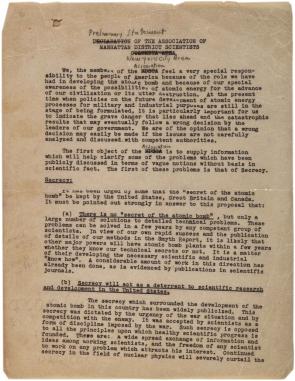Physicists predict a nuclear arms race, 1945
A Spotlight on a Primary Source by the Association of Manhattan District Scientists
This declaration of concern, written after the United States bombed Hiroshima and Nagasaki, offers insight into the Manhattan Project, an atomic development program led by the United States. The "Preliminary Statement of the Association of Manhattan District Scientists" emphasizes the need to control atomic weaponry and acknowledge the consequences of its use. The scientists warn of the havoc that nuclear weapons could wreak if not handled with extreme care and consideration. They also stressed their "very special responsibility to the people of America . . . because of our special awareness of the possibilities of atomic energy for the advance of our civilization or its utter destruction."
A heavily edited draft of the statement was found among the photographs and personal accounts of Mildred Goldberg, a Manhattan Project secretary. Goldberg unknowingly became a key contributor to the development of the atomic bomb as she typed out and organized the scientists’ notes. She described a pleasant work environment and expressed glowing admiration of the men she worked for—including Irving Kaplan, Francis Bonner, Andre J. De Bethune, William Nierenberg, and Howard Levi. This statement’s significance weighs even more heavily when one considers that this warning was written during a time when policies controlling the development of atomic energy were in their infancy.
View all pages of this document here.
Excerpt
We have been made strongly aware of the dangers inherent in the mishandling of this tremendous force by the peoples of the world. We have seen in the case of Hiroshima and Nagasaki that one crude, pioneering atomic bomb is sufficient to destroy a city of medium size. It is certain that further development will result in bombs of vastly greater destructive potential. The Pearl Harbor attack which destroyed most of Pacific Fleet may be dwarfed in a future war by a disaster in which as much as a quarter of our population and the major part of our industry will suddenly disappear. This may even be a conservative estimate of the damage that will occur before we are in a position to retaliate, if retaliation be any longer possible. It will be a small consolation to have the largest supply of the world’s best bombs; it may be too late to use them. It is possible that we may not even know who our attackers are.

